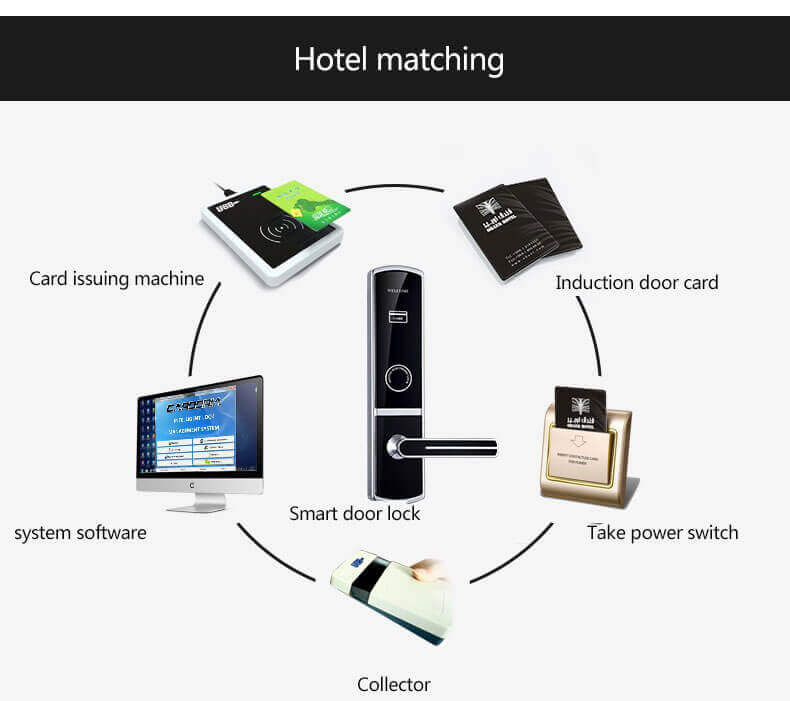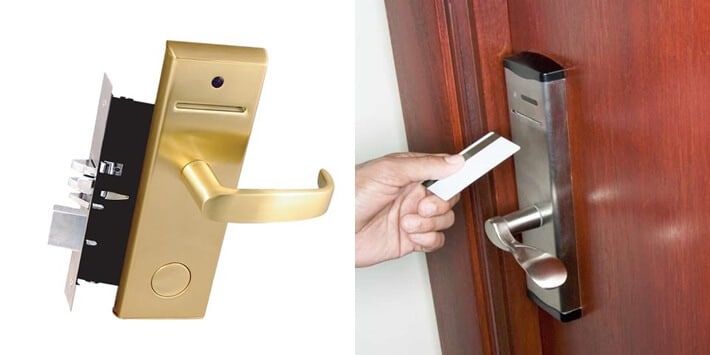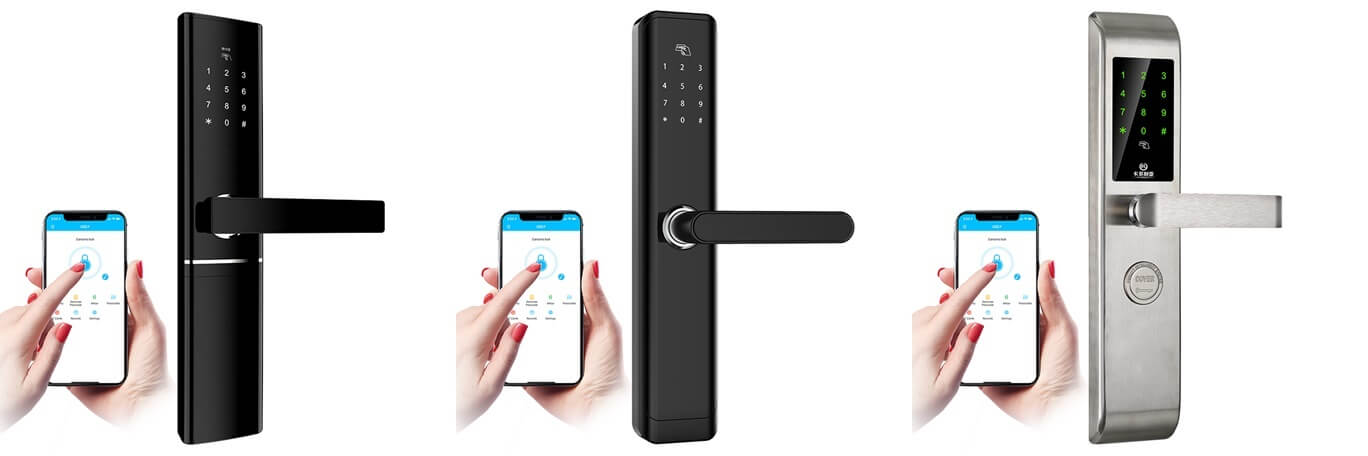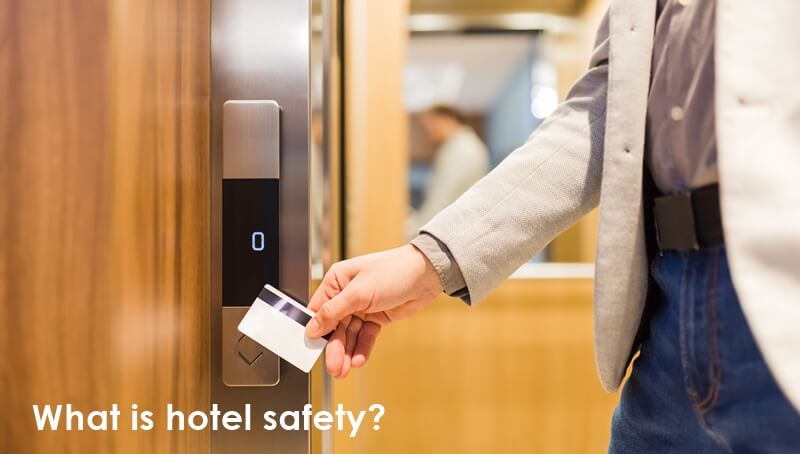7 Best Types of Hotel Door Lock System, How to choose?
If you are trying to build a new hotel, the hotel door lock system will be an important security system you have to consider. So what hotel door lock systems are there, and how to choose?
Similarly, if you are also considering replacing the old traditional mechanical hotel locks, which new electronic RFID hotel door lock system is more suitable for your hotel?
This article will introduce you to different hotel door lock systems, their advantages and disadvantages, and finally, tell you how to choose the most suitable one.
Mechanical Key Hotel Locks
Mechanical key locks are traditional locks that operate using a physical key. They consist of a lock cylinder and a corresponding key. The key has ridges or cuts that match the configuration of pins or tumblers inside the lock cylinder.
When the correct key is inserted into the lock, the pins or tumblers align, allowing the lock cylinder to rotate and unlock the door. Mechanical key locks do not require batteries or external power sources to function. They are simple, reliable, and have been used for centuries to secure doors.
However, they offer basic security features and lack the advanced functionalities of electronic locks, such as audit trails or remote access control.
| Advantages | Disadvantages |
| low cost; | chances of the key getting misplaced or forged; |
| hassle-free installation; | can be lock-picked; |
| various options according to the style; | no other features except locking and unlocking; |
| convenient to use. | There is no potential for enhancing the value of your hotel. |
| No ease of use for senior citizens or disabled people. |
Mechanical key hotel lock Applications:
Mechanical key locks are suitable for applications with sufficient basic security, such as residential buildings, small hotels, or interior doors within larger establishments.
They are also commonly used in areas where electronic devices may not be suitable, such as in environments with high electromagnetic interference.
While mechanical key locks are reliable and cost-effective, they may not offer the same security and convenience as electronic locks. The two choices depend on the property’s specific needs and priorities.
Electronic Keycard Locks For Hotels
Electronic keycard locks are locks that use electronic components to control access. They use keycards embedded with electronic chips instead of traditional keys.
Each keycard is programmed with a unique code corresponding to a specific lock. When a keycard is inserted or tapped against the lock, the lock reads the code. If the code matches the lock’s programming, the lock is released, allowing the door to open.
Pros:
- Enhanced Security: Electronic keycard locks offer enhanced security features, such as audit trails and the ability to deactivate lost or stolen keycards.
- Convenience: Keycards are easy to use and can be quickly replaced if lost or damaged.
- Integration: They can be integrated with other security systems, such as CCTV cameras or alarm systems.
- Remote Access Control: Some electronic keycard locks allow for remote access control, allowing administrators to manage access from a central location.
Cons:
- Dependency on Power: Electronic keycard locks require power, so they may not function during power outages unless they have a backup power source.
- Initial Cost: They can be more expensive to install than mechanical locks.
- Maintenance: Electronic locks may require more maintenance than mechanical locks, such as battery replacement and software updates.
Applications:
- Electronic keycard locks are commonly used in hotels, providing a convenient and secure way to control access to guest rooms.
- They are also used in office buildings, hospitals, and other facilities where access control is important.
Overall, electronic keycard locks offer higher security and convenience than mechanical locks, but they may require more maintenance and initial investment.
RFID Hotel Door Lock System
RFID hotel locks are electronic locks that use RFID technology to control access. They unlock the door using keycards or key fobs embedded with RFID chips.
Each RFID keycard or key fob contains a unique identifier that the lock’s RFID reader reads. When a keycard or fob is presented to the lock, the RFID reader reads the identifier and verifies it against a database. The lock is released if the valid identifier allows the door to open.
ShineACS Locks RFID Hotel Door Lock System
RFID hotel key cards are better than manual keys and barcodes due to various aspects, while both these can be easily forged. Let’s see some advantages of RFID hotel lock over the traditional lock and key mechanisms.
- Can be forged easily: No such devices can copy the radio signal, making it safer.
- Can be customized and reprogrammed: RFID hotel key cards only provide access to the lock for a certain period. Such specific programming provides efficient management and working by locking any unwanted movement in unauthorized areas.
- Anonymous: There are no specific marks for recognition, so only the actual user and the hotel door lock system software can recognize the card and its authorization.
- Convenient deactivation process: By any chance, if the card gets misplaced or stolen by someone, deactivation helps secure any unwanted use.
- Feasible to the budget: The traditional hotel door lock systems require changing the whole lock of the door if the key is lost, but with key cards, it is easy to discard the card’s authorization without changing the lock.
| Advantages | Disadvantages |
| Contactless and reusable use; | Compared with traditional mechanical locks, the RFID hotel lock system price is higher; |
| Different guests use exclusive RFID cards; | Unable to unlock when the lock is out of power; |
| No need to carry mechanical keys; | RFID cards are easy to lose; |
| Centralized and unified management with hotel lock software | |
| RFID cards can set valid times; | |
| RFID cards can be used to control room power and hotel elevators | |
| Apply to: | Most Morden hotels that need centralized and unified management hotel rooms |
So, suppose your current hotel lock system is still a traditional key lock, which is too old and cannot meet the security needs of your hotel. In that case, it is a good choice to consider upgrading your existing one to an RFID hotel lock system.
Magnetic Stripe Lock System
A magnetic stripe lock system is an electronic locking system that uses keycards with magnetic stripes to control access to a door. These keycards are similar to credit cards and contain a magnetic stripe on one side. The lock system reads the information stored on the magnetic stripe to determine if access should be granted.
How It Works:
- Encoding Keycards: Keycards are encoded with specific information that the lock system can read. This information typically includes a unique identifier for the card.
- Swiping the Keycard: A user swipes their keycard through a magnetic stripe reader on the lock to unlock a door. The reader reads the information stored on the magnetic stripe.
- Verification: The lock system verifies the information on the keycard against its database. If the information matches and the card is authorized, the lock is released, allowing the door to open.
- Deactivation: If a keycard is lost or stolen, it can be deactivated. This prevents unauthorized access even if someone finds or steals the card.
| Advantages | Disadvantages |
| Lower cost compared with RFID card locks; | Electromagnetic fields easily demagnetize magnetic cards; |
| Easy to use, need magnetic swipe cards; | The magnetic card reader card slot is susceptible to dirt and dust; |
| Mature technology; | Magnetic cards are rarely reused; |
| Unable to unlock when the lock is out of power. | |
| Apply to: | Cheap budget hotels with lower-end and lower-cost needs |
Magnetic stripe lock systems offer higher security and convenience than mechanical locks, but they may require more maintenance and initial investment. They are gradually replaced by more secure technologies such as RFID and smart card systems.
Keypad Hotel Door Lock System
A keypad hotel door lock system is an electronic locking system that uses a keypad to control access to a door. Instead of using a keycard or traditional key, users enter a code on the keypad to unlock the door.
How It Works:
- Keypad Entry: To unlock the door, a user enters a pre-programmed code on the keypad.
- Code Verification: The lock system verifies the entered code against its database. If the code is correct, the lock releases, opening the door.
- Multiple Codes: Some keypad lock systems allow multiple user codes to be programmed, each with different access permissions.
- Battery Powered: Keypad locks are typically battery-powered, so they can continue to operate during power outages.
- Manual Key Override: Some keypad locks have a manual key override option in case the keypad fails or the battery dies.
But under normal circumstances, the traditional general hotels no longer use this pin code hotel door lock system.
Currently, the pin code door lock system is mainly used in Airbnb hotels, apartment hotels, and short-term rental houses.
| Advantages | Disadvantages |
| Multi-user access; | Password needs to be changed regularly; |
| Password opening is more reliable in emergencies; | Passwords are easy to leak; |
| Password is easy to remember; | |
| Multiple users can use it. | |
| Apply to: | Apartment-style hotels, Airbnb hotels, and rental houses need to be used and managed independently |
7, Mobile Access Hotel Door Lock System
A mobile access hotel door lock system is an electronic locking system that allows guests to use their smartphones as keys. Instead of using a physical key or keycard, guests download a mobile app the hotel provides, which communicates with the door lock via Bluetooth to unlock the door.
How It Works:
- Mobile App: Guests download the hotel’s mobile app and register their smartphones.
- Bluetooth: The mobile app communicates with the door lock via Bluetooth or NFC when guests approach their room.
- Door Unlocking: If the guest is authorized, the door lock is unlocked, allowing them to enter their room.
- Key Expiration: Mobile keys can be set to expire after a certain period, enhancing security.
Of course, the mobile key hotel lock system is usually unsuitable for a traditional hotel, especially if your goal is to reduce operating expenses.
The mobile key hotel system is mainly used in high-end apartments and rental houses.
| Advantages | Disadvantages |
| Quick check-in experience; | Need cellphone; |
| Contactless and safe check-in; | Need Bluetooth or WIFI; |
| Easy to use your phone to open the door; | You may need to install additional apps; |
| Multiple door-opening methods are optional. | It is inconvenient for older people or people who rarely use mobile phones. |
| Can remotely send a Bluetooth key or password to open the door | |
| Apply to: | High-end hotels, apartments, and rental houses with higher security requirements |
If you want to buy and use a mobile key hotel door lock system for your hotel, please check our TTlock smart locks.
Other factors you need to consider:
Compatibility with Hotel Elevator System: Hotel door lock systems need to be compatible with and manage hotel elevator control systems, more helpful in hotel room safety, protect guests
- Compatibility with energy-saving switch: Hotel door lock systems would be better compatible with hotel energy-saving switch, which means hotel customers will have to insert a room card into the hotel key card switch to get room power.
- Communication –The locks should be wireless and capable of reading/writing and networking with the whole system.
- Design – The hotel door lock system must be advanced to safeguard against unwanted activities.
- Accessibility –The lock should be accessible from anywhere to assess the security system anytime.
- Mobile – It would be better to connect with smartphones through Bluetooth.
- Connection – The Lock system should integrate with other mechanisms for effective working like parking, CCTV, hotel key card power switch, etc.
- Security –Check and process management for access permissions.
- Growth –Should be able to enhance operation when required to implement in large-scale use.
- RFID –Should be able to work with almost all RFID mechanisms.
Conclusion
In conclusion, the various hotel door lock systems available today offer diverse security solutions tailored to different needs and budgets. From traditional mechanical locks to mobile access systems, each type provides unique benefits and challenges.
As technology continues to evolve, hoteliers must stay informed about the latest developments in security to ensure the safety and satisfaction of their guests. Choosing the right lock system is crucial for maintaining a secure and welcoming environment in any hospitality establishment.







